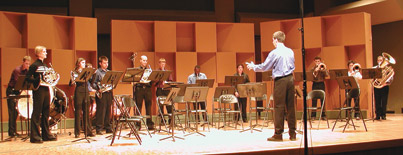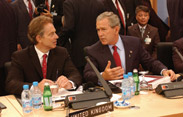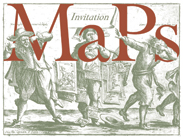Around campus
Hum along for humanity

Randy Potzger
Music undergrad Simeon Morrow likes to mix music with humanitarian causes. "Often people think of music as elitist, as coming from an ivory tower, but I see it as a social vehicle."
The major in double bass and conducting has been in music for years, but after reading Martin Luther King, Ghandi, Henry David Thoreau, he began to wonder how his métier could have a greater social effect.
He aimed to raise and answer philosophical questions through twentieth- and twenty-first-century music. "Because music is abstract, it can be anything to anyone." So he formed the Ensemble for Humanity Symphony Orchestra, made up mostly of McGill music students. The non-profit orchestra raises funds to benefit humanitarian organizations.
Last year's concert featured dark war-inspired works by Copeland and Shostakovich, before finishing with Copeland's hopeful "Appalachian Spring" for a newlywed couple. This year, Morrow tackles the Estonian Arvo Part, from his third phase of composition that occured after he studied medieval music. Morrow wants to show that music is all around us. "I hope by the end of the concert, people will realize that music goes on forever," he said. As Arvo Part quoted Japanese poet Basho "Even though the temple bells have stopped, the sound keeps coming out of the flowers."
"Tabula Rasa: Finding Serenity at the Heart of Sound" Arvo Pärt: Tinntinabul; conductor Simeon Morrow, violinists Julia Bushkova and Filip Fenrych. Friday, April 29 and Saturday, April 30, 8 pm Christ Church Cathedral, 635 Ste Catherine Street W. Tickets are $15/$25 and are available at the door or in advance through www.ticketpro.ca, 908-9090. Proceeds go to the Montreal Children's Hospital.
Cool Britannia

Tony Blair and George W. Bush share a moment at a NATO meeting.
Courtesy NATO
One Spring day in 1997 Tony Blair became Prime Minister of Britain, with a resounding majority of 179 seats, the largest ever for the Labour Party. It was, appropriately enough, May Day.
Blair's slogans – a promise to lead Britain by a "Third Way" to a future as "Cool Britannia" – seem, only eight years later, as relevant to politics today as the Spice Girls are to popular music.
What happened? Now is as good a time to examine the question as any, as Blair seeks a third term on May 8. McGill and the Université de Montréal are co-hosting a conference examining United Kingdom after eight years of Blair.
They've been heady times in Great Britain — the Good Friday accord in Ireland, new Parliaments for Scotland and Wales, the Iraq war changing relations with both the United States and the European Union and a revamped House of Lords.
The conference will bring together speakers from Britain, the U.S. and Canada, including a keynote address from Geoff Mulgan, director of the Young Foundation, former director of the Government's Strategy Unit and head of policy in the Prime Minister's office, as well as former director of the think tank Demos, that played a crucial role in the conception of the Third Way. Events will be split between U de M and McGill, including a live telecast of the election results in the Faculty Club at 3:30, with a cash bar.
What Ever Happened to Cool Britannia? The UK after eight years of Blair 4-6 May 2005 at the Université de Montréal and McGill For more information and to register see www.cerium.ca.
Kids' bodies, kids' selves

Courtesy TZIGANE
A recent study shows one in five Canadian children are overweight — yikes! Dr. Suzanne MacDonald, pediatrician of The Montreal Children's Hospital will talk about eating problems, fad diets and the pressure to be thin and conform to the advertising media's views of beauty. How're kids supposed to keep a healthy body image these days when they're being told to be svelte while being bombarded with ads for fast junky food?
Children, teens and body image in the 21st century. Tuesday, May 3, 7:30 pm, Montreal Children's Hospital amphitheatre, 2300 Tupper St. Admission is free. For more info: 412-4307.
Clutter, clutter everywhere, nary room to think

Courtesy McGill Archives
Everybody knows one of those people - folk whose rooms and office spaces are bursting at the seams with old papers, knick knacks covering every spare surface, posters advertising events long forgotten decorating the walls.
University Archivist Johanne Pelletier understands this urge. She will be delivering the annual Maysie MacSporran Annual lecture of the James McGill society, tantalizingly titled "The Secret Life of Things."
"In material culture studies we talk about the relationship with the things we collect, in the sense that they are meaningful," she said, pointing to programs such as Antiques Roadshow that encourages people to discuss their relationship with the things they bring in to be examined, which are often more interesting than the appraised value of the object.
"What I'm going to be talking about is how the archives collect material, what some of the lore is behind the material we've collected, who the archivists have been in the past and what sort of characters have been."
In addition, Pelletier will discuss the operations of the archives, including the progress of the digitalpermanence project, which seeks to establish rules and procedures by which electronic records can be saved.
The topic is a step away from the straight history topics of the James McGill Society, made up of staff and alumni with an interest in McGill history. Pelletier promises that it will be a light and fun look at the topic. All are welcome to attend.
The secret life of things: Perspectives on collecting at the McGill University Archives, Monday, May 2, Faculty club Ballroom. Reception 5 pm, Presentation 5:30 pm.
Mapping cultures

ENGRAVING BY GIUSEPPE MARIAMITELLI
Threads from the warp and weft of the Renaissance period extend to the tapestry of our own public contemporary culture.
Paul Yachnin, McGill's Tomlinson Professor of Shakespeare Studies, is leading an international, interdisciplinary team of researchers whose goal is to illuminate the artistic, intellectual, religious, social and political culture of Britain and Western Europe between 1500 and 1700. The project will develop an innovative and potentially transformative approach to the history of early modernity, and will examine the ways early modern publics shaped the twenty-first century.
The launch of the project will feature a talk by the energetic Yachnin, and a performance of Renaissance music on piano by Rachelle Chiasson-Taylor, from the Faculty of Music. We're all invited to the celebratory reception afterwards, too.
MaPs Project — Making Publics: Media, Markets and Association in Early Modern Europe, 1500-1700 will be May 12, 4 pm, at Moyse Hall in the Arts Building.
